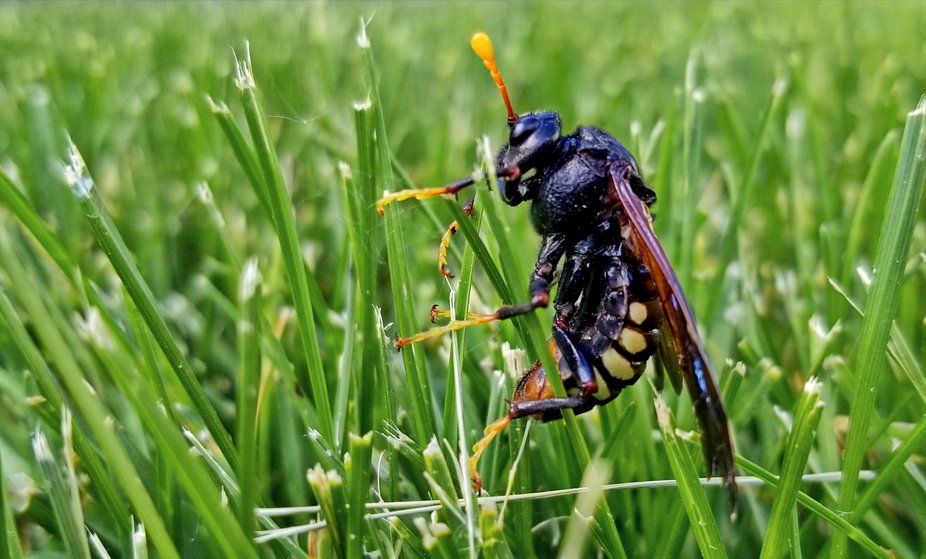As a homeowner there’s nothing more annoying than looking out your window and seeing wasps flying all around your lawn. You might be wondering why are there so many wasps buzzing over my grass? Is there something attracting them to my yard? Don’t worry – you’re not alone. Many homeowners deal with wasp issues in their lawns, especially during warmer months. In this article, we’ll explore some of the main reasons wasps might be drawn to your grass and tips for discouraging them humanely.
Common Causes of Wasps in Your Grass
There are a few key factors that can attract wasps to your lawn and garden spaces, Here are some of the most common causes
Food Sources
Wasps need food to survive, and your yard likely offers plenty of tempting options. Fallen fruit from trees, juices from grilling, sugary drinks, and nectar from flowers can all be major food sources for wasps. If you’ve recently had a outdoor party or family gathering, leftover sugars and proteins on plates or tables can also attract foraging wasps.
Underground Nests
Some species of wasps, like yellowjackets, build nests underground in abandoned rodent burrows or cavities. If you have a nest beneath your lawn, you’ll see increased wasp activity as they fly in and out of the entrance. Underground nests are very common and a major reason you may see wasps hovering over your grass.
Warm Temperatures
Wasps become much more active during warm weather months like summer and early fall. Higher temperatures rev up their metabolism and stimulate increased foraging. So if you notice more wasps in your yard during summer, the heat is likely a contributing factor.
Standing Water
Like bees, wasps need a water source to maintain hydration. Small pools of standing water from lawn irrigation, leaky hoses, or recent rains can act as an inviting watering hole. Make sure to drain any standing water so your lawn isn’t as enticing for thirsty wasps.
Bare Dirt Patches
If you have areas of bare, exposed dirt in your yard, this can also appeal to ground-nesting wasps. The bare dirt provides an untended spot for them to dig a nest entrance without obstruction. Reseed and fill in any bald spots to deter nests.
Compost Piles
The smell and food scraps found in compost heaps are highly attractive to wasps. Make sure your compost bin has a fitted lid and is contained in an out-of-the-way corner of your yard, not close to prime wasp nesting sites.
Tips for Deterring Wasps From Your Lawn
Now that you know what draws wasps to your grass, here are some tips for making your yard less appealing:
-
Remove food debris like fallen fruit or sugary spills promptly. Don’t leave attractants sitting out.
-
Water grass and gardens early in the morning so puddles dry up. Eliminate standing water.
-
Seal up holes, low spaces, and bare dirt areas that could become nest sites.
-
Use essential oils like lavender, peppermint, tea tree, or eucalyptus as natural wasp repellents.
-
Install traps around the perimeter of your yard to catch foraging wasps.
-
Apply food-grade diatomaceous earth on grass as a non-toxic deterrent.
-
Plant flowers wasps dislike, like geraniums, catnip, and pennyroyal.
-
Inspect lawn areas regularly for nests and call a pro to remove established ones.
-
Apply beneficial nematodes to your soil, which parasitize wasp larvae.
-
Use fake nest decoys to send the signal your yard is already “taken.”
When To Call A Wasp Control Professional
While the tips above can help make your yard less hospitable to wasps, an established nest will require professional treatment. It’s best to call in the experts if you spot:
-
Multiple wasps going in and out of one area consistently. This indicates a nearby nest.
-
Rapidly increasing wasp activity on your property within a few days.
-
Aggressive guard wasps that dive bomb or chase you out of an area.
Attempting to destroy a wasp nest carries risk of multiple stings, so always err on the side of caution. Professional exterminators have protective gear and expert knowledge of the most effective nest removal methods.
Coexisting With Helpful Wasps
While wasps around your lawn can be a nuisance, remember that not all of them need to be eliminated entirely. Many species are beneficial predators of garden pests. With smart prevention and non-lethal deterrents, you can take steps to reduce unwelcome wasps while still supporting those who benefit your yard’s ecosystem. Avoid totally eradicating wasps and your outdoor space can remain in balance.
How to deal with wasps in your yard
FAQ
Why are wasps hovering in my grass?
Why are there so many wasps in my yard?
How do you treat grass-carrying wasps?
Why are wasps on my lawn?
Wasps are on your lawn because they are feeding on sugary substances like fruit, honeydew, and spilled food. Wasps are on your lawn for egg-laying purposes. There are three possible reasons why wasps would be on your lawn, but many more methods by which you can get rid of them naturally.
Are there wasps in grass?
Common Types of Wasps in Grass There are several types of wasps that are commonly found in grassy areas, including: Yellow jackets: These aggressive wasps are yellow and black striped and often build their nests in underground burrows or cavities in trees and buildings.
Are wasps stinging your lawn?
If you’re a homeowner who loves spending time in your backyard, you may have encountered wasps buzzing around your lawn. While wasps can be beneficial for pollination and controlling pest populations, they can also sting if provoked, causing painful and sometimes dangerous reactions.
- A Complete Guide to Caring for Yuki Cherry Blossom Shrub - January 23, 2025
- Identifying Red Hot Poker Seeds: What to Look For When Harvesting Torch Lily Pods - January 23, 2025
- A Complete Guide to Harvesting Evening Primrose Seeds - January 23, 2025

